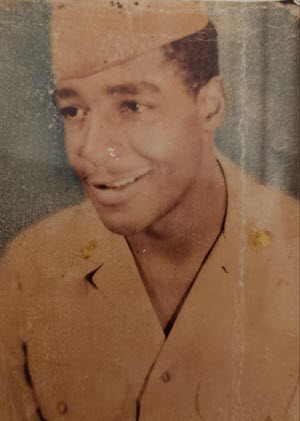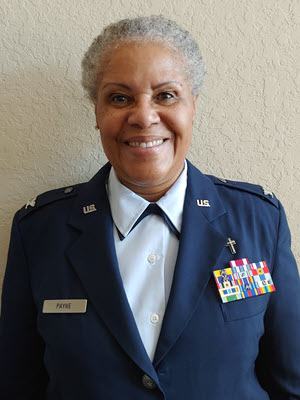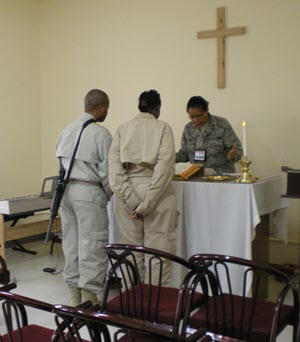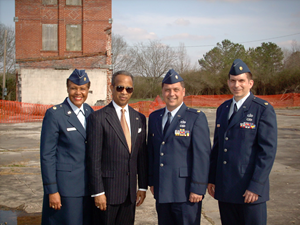By WO1 David Brown, Texas State Guard
SAN ANTONIO - During World War II, Sgt. Percy Howard Payne was assigned to the support team of the 332nd Fighter Wing of the U.S. Army Air Corps, better known as the Tuskegee Airmen— America’s first black aviators. A generation later, the Payne family would again make military history, as Col. Paula Payne became the first black woman to serve in the rank of colonel in the Texas State Guard.
As part of the Tuskegee Airmen, Percy Payne worked in procurement and used his talents as a musician and entertainer to support troop morale as part of Operation Happiness. Serving at a time when the U.S. military was racially segregated, Percy Payne found himself denied leadership roles, as black Soldiers were denied entry into the officers corps. Frustrated with a system that denied advancement based on race, Percy Payne left the military when the war ended. 
Undeterred by her father’s treatment, Paula Payne enlisted in the Virgin Islands Air National Guard after finishing her undergraduate and graduate education. According to Paula Payne, the decision was not well received by her father.
“He told me ‘I just hope they treat you better than they treated me,’” said Paula Payne.
Describing herself as “a rolling stone”, Paula Payne described her career in the Guard as highlighted by travel and full of support from her superiors. Her first move was to Andrews Air Force Base after transferring to the District of Columbia National Guard. Upon arrival, she met a commander with a link to her family’s past military service.
Lt. Gen. Russell C. Davis was the commander of Paula Payne’s new unit, the 113th Fighter Wing, and also a native of Tuskegee, Alabama. According to Paula Payne, Davis took quick interest in her career development and coordinated for her to obtain a full time position with the Air National Guard.
“When I arrived to the 113th, Lt. Gen. Russel asked ‘Why do you want to do weekend drills? We need some people for active duty at the Air National Guard Support Center and the National Guard Bureau!’” said Davis.
 Davis’ recommendation helped Paula Payne become the first enlisted airman to serve in the Chief of Chaplain’s Office at the Air National Support Center. The move also put Paula Payne on the path to joining the ministry. Payne went on the earn a masters degree in divinity from Wesley Theological Seminary, and direct commissioned as a 2nd Lieutenant.
Davis’ recommendation helped Paula Payne become the first enlisted airman to serve in the Chief of Chaplain’s Office at the Air National Support Center. The move also put Paula Payne on the path to joining the ministry. Payne went on the earn a masters degree in divinity from Wesley Theological Seminary, and direct commissioned as a 2nd Lieutenant.
“I started all over again from the bottom of the officer’s ranks, separated from active duty, and transferred over to the Air Force Reserves as a chaplain candidate.”
Paula Payne served in a variety of pastoral duties rotating between the Air National Guard and Air Force Reserve following her commission, until the terror attacks on September 11, 2001 called her back to full-time service as the Air National Guard’s first black female chaplain.
Paula Payne’s first combat deployment led her to Balad, Iraq as part of the 332nd Expeditionary Medical Group, a component of the 332nd Fighter Wing, her father’s former unit. Though prejudice kept Percy Payne from rising through the ranks, his daughter Paula was named the senior chaplain at Joint Base Balad.
During her time in Iraq, Paula Payne described the attacks as non-stop, recalling one night when a mortar struck near her quarters.
“You could hear the faint eeeee... boom, and it was close to my hooch, the housing location of the medical group. The rocket was launched in the middle of the night. I felt the thing hit the ground, PA-PUM. Then I heard ‘Nobody move, shelter in place!” said Payne.
An hour and a half went by as the Explosive Ordnance Team attempted to defuse the mortar. Paula Payne sheltered in place, praying. 
“I knew I was going to die if I stepped out that hooch and made one move.” said Payne. “Then came the sound of an explosion, the next thing I heard was someone shout for the chaplain.”
Immediately, it was back to work for Paula Payne as she ran to the site where a young airman died attempting to save his fellow service members.
“If it were not for him, it could have been me or anybody else. He was my hero,” said Payne.
Following her six months in Iraq, Paula Payne deployed to multiple assignments across Europe and the United States before retiring as a lieutenant colonel in 2014. Thinking of what life might hold next, she remembered the stories of her grandfather, who had grown up in Texas as the son of a Methodist preacher. It inspired her to pack her bags again, and this time, she and her twin sister Patricia Payne, an Army veteran, decided to relocate to Texas. According to Payne she sensed something waiting for her there.
Four years later, Payne took the oath of office becoming the first black female colonel to serve in the Texas State Guard. Payne had worked towards attaining that rank in both Air National Guard and Air Force reserve, but she was never selected.
“I had finally come to terms that the promotion was not God’s plan.” said Paula Payne. “Then the Governor signed the promotion order. When I die, my obituary will read, “Chaplain, Colonel, Paula M. Payne. Texas did that for me.”
